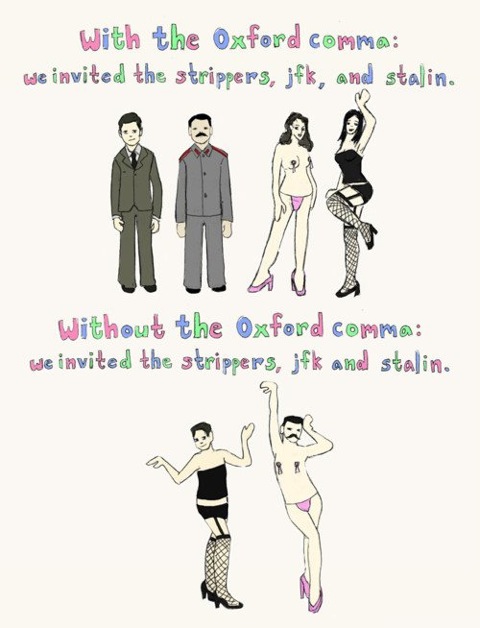by Jason Stotts
I detest when people don’t use the “Oxford Comma,” which, sadly, is no longer used even by Oxford. For those who don’t know, it’s the last comma in a set before the “and.”
Let’s say you want to talk about three separate things, you would write it thus: A, B, and C. Logically, you’d be talking about the set of the three where each is independent of the other {A,B,C}. Now, you could also talk about three things where not all three are separate and you would write it thus: A, B and C. Logically, you’d be talking about the set {A,B&C}, where A is discrete while B and C are conjoined. This is not the same thing at all!
What if A, B, and C were all themselves sets of two variables? I would write it: A and Z, B and Y, and C and X. Which is logically {A&Z, B&Y, C&X} Without the Oxford comma, I’d have the mess of: A and Z, B and Y and C and X. This is, perhaps, because who really knows, represented as: {A&Z, B&Y&C&X} and since in logic you can transpose variables that are conjoined, A&B is the same as B&A, I might be talking about {A&Z, B&X&Y&C}. This is all logically the same. But if we put values onto those variables, you can imagine the problems that might arise! Thus, the Oxford Comma is logically necessary.
Commas are very important and they shouldn’t be treated lightly, otherwise you could end up with:
Let’s eat mother!
Instead of:
Let’s eat, mother!
Or, to use a problem that the Oxford Comma might create:
And if you don’t understand the problem, please stop reading my blog. It is much too advanced for you.

Comments
3 responses to “The Logical Necessity of the Oxford Comma”
I am also a fan of the Oxford comma because when people don’t use it, it slows up my reading. I like to receive the programmed grammatical cues that I am used to in order to blitz through a sentence with the least possible thought put on the logical groupings and the most possible thought put on the content of the sentence.
But, to be fair, the people who don’t use the Oxford comma routinely, do advocate using it in situations like the above. They use it when there could be confusion or two ways of reading the sentence. They just don’t use it when it’s perfectly clear without the comma. For instance: I bought apples, oranges and grapes at the store.
My favorite example of the problem your cartoon portrays is
“I’d like to thank my parents, God and Ayn Rand.”
Utterly agree with you. Well set out.